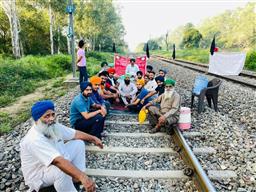
Photo for representation only. - File photo
Roshni Johar
THE over a kilometre-wide Mahanadi river flowed 60-70 metres away, right behind our bungalow in Cuttack, Odisha’s former capital. In the mid-1960s, there was no bridge over it. Only a temporary fair-weather bridge of floating wooden planks kept in place by sand bags existed. Often we would drive over it, to the Mahanadi’s other side to picnic under huge banyan trees.
Cuttack, Odisha’s oldest city, called Abhinabha Baranasi Kataka in medieval times, was perpetually in grave danger of floods, being situated on a delta formed by the Mahanadi and Kathajodi rivers, their several rivulets criss-crossing the countryside.
Every year, during summer’s scorching heat, the much-awaited monsoon devta would arrive, riding high on a chariot of dark thundering clouds that would burst into rain. Then, the sleepy and silent, almost 851-km-long Mahanadi, that arose from the hills of Chhattisgarh’s Sihawa mountains, would swell and overflow its embankments, notorious for devastating floods.
Invariably, the first casualty of floods was the temporary bridge, which would disappear from sight, being submerged under gushing waters. Standing on the lawn’s edge behind our bungalow, I would watch the flood’s fury. Uprooted trees and bushes, goats, cottages, thatched roofs, utensils, umbrellas, bundles of clothes and assorted household goods et al, floated speedily on muddy waters.
Once when the Mahanadi’s level rose, ankle-deep river waters entered our rear lawns. We could hear, especially in the quietness of night, the sound of the lapping of dangerous river waves. I was a schoolgirl then and had a feeling of more awe but less fear.
At night, Neelima, my help, would go hunting for frogs that croaked shrilly at regular intervals in the flooded lawns. She would hitch up her sari and then break a small twig from one of many custard apple trees growing in the garden, and expertly tipped frogs into an empty Ovaltine tin to relish at dinner. Her husband, our khansama, laced the reptiles with tamarind and chillies.
Most of my classmates remained absent as their parents feared for their children’s safety if Cuttack got suddenly flooded. One afternoon, when I returned home from school, I found mummy had rolled up the carpets and hurriedly packed almost everything in trunks that were fitted in wooden crates. An Army station wagon stood on the front porch. We were ready to leave in a moment’s notice if the Mahanadi’s level rose further and water entered our one-step high residence. But thankfully this didn’t happen.
Daddy was busy conferring with the civil administration on how to control the flood. But the Mahanadi failed to ebb. Eventually, the authorities saved Cuttack by breaching the river on the outskirts of the city.
Tribune Shorts
Most Read





















